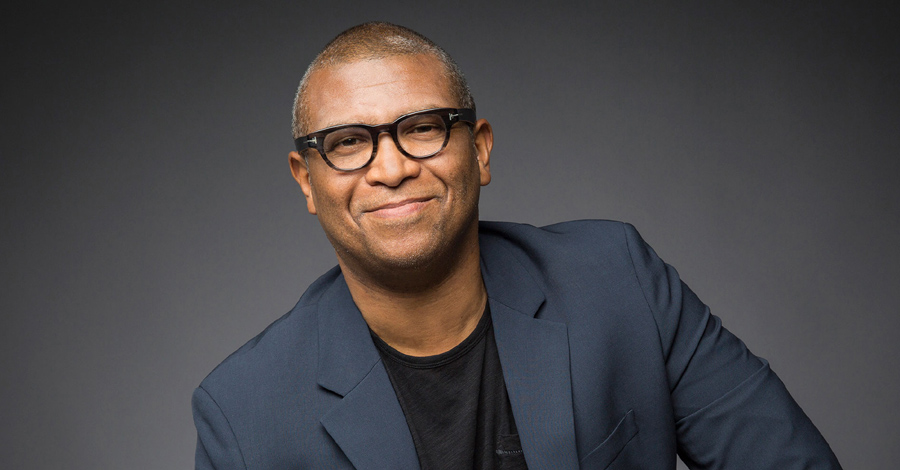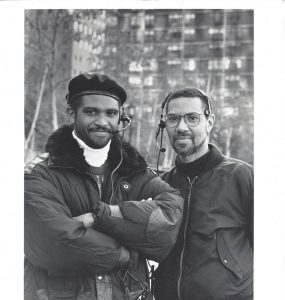REGGIE HUDLIN’S HOUSE PARTY
By Janis Lowe
Q: When did you become interested in film making?
A: My brother is a film maker. When I was a kid, he would take me to a lot of foreign films as well as American independent and art films. So I started
thinking about movies I wanted to make. When he would come home from college, I would tell him my ideas. So, one time he came home for Christmas break and gave me a diary. He said “Don’t tell me about your ideas
anymore. Write them down.” That’s when I first started writing scripts.
Q: When did you know you wanted to be a professional film maker?
A: I didn’t make a conscious decision until I was graduating from high school and it was time for me to pick a college. Of course when you pick a college, you have to decide what you want to study. That’s when I realized what I wanted to do.
Q: Where did you attend college and what did you study?
A: I went to Harvard. There was a major there called Visual and Environmental Studies which is sort of an umbrella term for anything
arts related. While my main area of concentration was film, I also studied
photography, graphic arts and architecture.
Q: How should an aspiring film maker go about educating herself or himself?
A: It’s actually fairly easy to learn how to make a film. You can learn by working with other film makers or going to film school. The important thing is to learn things to make movies about. You must be a good storyteller. You must have a grasp of politics, philosophy and psychology. That’s why I chose Harvard. With a good all-around education, I felt I could make films people would want to watch. Most people tend to overlook what you’re saying (with a film). which is more important than how you say it.
Q: Can you tell me about your brother and the Black Film Foundation?
A: When my brother was a student at Yale, he made a film that people loved wherever he showed it. But when he took the film to a distributor, he would be told that there was no market for it. He knew otherwise. He got together
with some friends–people he went to college with, and formed a distribution cooperative for film makers. Ten years later, the Black Film Foundation is the largest distributor of Black independent films. They recently celebrated their 10th anniversary. They were the fiscal agent for Spike Lee’s film, She’s Gotta Have It. They’ve really played a crucial role in the contemporary success of Black independent film.
Q: The Black independent film tradition is at least 70 years old. Why is this not common knowledge?
A: Much information about Blacks being empowered is repressed. It is important that Blacks continue to make films. A lot of people mistakenly
believe that a movie is Black if a Black appears in the film. The true definition of a Black film is when a Black person is the creative influence behind the camera. If the writer, the director, and the producer are Black, then it is a Black film. Black subject matter does not qualify a film as Black.
Q: You mentioned that the Black Film Foundation was fiscal agent for She’s Gotta Have It. Is Spike Lee involved with the foundation in any other way?
A: He’s very supportive of the organization, financially. He’s the largest individual contributor. The foundation hosted the premier of She’s Gotta
Have It, and has given him an award for helping to break down barriers in the film industry.
Q: Several Black films made in the seventies were financed by independent
groups of Black business people. Do you foresee an increase in such cooperative efforts?
A: Those kinds of efforts are very difficult to put together. Blacks have to be willing to put out a few thousand dollars and possibly lose that. Many Blacks don’t have those kinds of resources. However, I think the success of
She’s Gotta Have It and Hollywood Shuffle have encouraged people to attempt low budget pictures and I hope more will be successful.
Q: Do you feel Blacks have the economic power to control their media image?
A: Yes, if Blacks employ other Blacks whenever possible, the first battle is won. If a Black musician has a Black manager, hires a Black company to do the music video, goes to a Black studio to record his album, insists upon a Black agent, we could take over the entertainment industry. Blacks have the number one show on television, the number one movie star, and the number one recording star. If we put Black nationalism to work within the entertainment community, we could control a sizable chunk of one of America’s largest industries.
Q: Do Black film makers have a responsibility to the Black community?
A: All of the Black film makers I know went into film making because they wanted to make a social statement. Considering the amount of money it costs to make a film, I don’t think you can spend that much money, get that much of people’s time and attention and not say anything.
Q: Tell me about your film, House Party?
A: It began as my thesis at Harvard in 1983. When I was a kid writing scripts, I promised myself that I would one day capture my various mis-adventures on film. I said to myself, “This might be the only film I ever make so I better keep my promise.” So, I made the short version of House Party which was twenty minutes long and very successful. I entered the film in a lot of film festivals . It played a lot on the short film circuit. After the success of She’s Gotta Have It, Hollywood studios were looking for Black film makers. New Line Cinema had heard about me and wanted to see some scripts. I sent them two and they decided to produce House Party as a feature film.
Q: Is anyone from the original cast in it?
A: I tried to but most of them were not living at the same address after six years. I hope to work with some of the original cast when other projects come up.
Q: What did you have to do to get the original House Party seen by people who would possibly produce it?
A: I sent copies of the video tape around to people. I also had the film distributed by the Black Film Foundation. Through the Foundation and word-of-mouth, people became aware of the movie. Also, when Spike Lee
became successful and was deluged with offers, he would put in a good word for me. Some opportunities came that way.
Q: Will young Black men find positive role models for themselves in your work?
A: I think so. If there’s a central message at the heart of the film, it’s about birth control. We try not to moralize. We respect their intelligence as audience. When I was a kid I hated to be preached to so I try not to preach to kids. At the same time, if there’s a crucial issue in America today, its babies making babies. That you can’t blame on the White man. It is our special organs that are doing that. If we put ourselves in check, that’s a huge problem that can be eliminated.
Q: One of the #1 problems among Black youths in our society is lack of self-esteem. How can we best build self-esteem in our young people?
A: The problem is kids’ lack of knowledge of Black history. When I was coming up, I never felt inferior. I knew everyone in my family was intelligent and I knew the achievements of Black people as a whole. I never felt that I could not do something because I was Black.
Q: Who helped to instill this positive attitude in you?
A: There were many influences but the number one influence was my family.
Q: Is there any particular school of philosophy or thought that encouraged you?
A: The attitude of “do for self”. No one owes you anything. The system may be corrupt but you don’t hold your hand out and say, “you owe me something”.
You take what you deserve.
Q: Is there anything that has hurt or hindered you in the process of becoming a successful film maker?
A: The film industry, like most other industries, is prejudiced. Because it is a culturally based industry, it is even more biased. Success in the industry is based on aesthetics, what is considered funny and entertaining. I go to Hollywood studios and I don’t even see Black secretaries or janitorial staff. That is very disheartening.
Q: Is your staff at House Party a Black staff or an integrated one?
A: The industry standard is five percent Black participation. We have sixty-five percent Black participation.
Q: How can we best build institutions such as banks, theaters, cultural centers, social and economic networks that will help African Americans enter the ranks of the financially successful?
A: Its a two fold thing. On one hand successful Black institutions are usually based around someone who says, “the buck stops here.” Someone willing to take ultimate responsibility. But of course, one person can’t do it alone. For us to build institutions, we have to have people who are willing to sacrifice. This is difficult for us to do on a day-to-day basis because Blacks often have a hard time in service positions. We don’t like working for anybody. We remember when we weren’t benefiting from the fruits of our own labor. However, we can’t afford that mentality now that we’re doing for ourselves. I think the first step is to take the attitude that this is ours and we have to work hard, even if we work for someone else. We have to work as if we owned it. The second step is the successful transition of power. Lots of times, we based an organization or a movement around a charismatic, intelligent leader. When that figure retires or is killed–that’s it. Then cut off the head and the body dies. We need to build succession.


